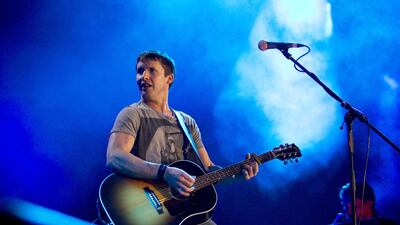James Blunt is buzzing with nervous excitement. The 39-year-old English singer-songwriter is writing out song lyrics by hand, sorting out artwork, bagging up his favourite new songs and generally chomping at the bit for the world to hear his new album, Moon Landing.
A record he describes as the natural successor to his breakthrough debut, Back to Bedlam, it’s clear that his fourth studio album is particularly close to his heart.
Why Moon Landing?
The moon landings were stark, lonely affairs and this album has the same feeling. The recordings have a lot of space. It’s also a throwback to this huge achievement that one struggles to achieve again. Like first love, like a first record – all those things are what the title means to me. The result is the album I would have recorded if Back to Bedlam hadn’t sold in its masses.
Did the success of that album take you by surprise?
I wrote and recorded Back to Bedlam as an independent artist, with an independent producer called Tom Rothrock who had worked with Beck, Elliott Smith and Badly Drawn Boy. We made this sparse album with a lot of naivety and charm, and it happened to include a song called You’re Beautiful, which took it from being independent to being a dirty word: “mainstream”.
It took me on an amazing journey. I did three world tours and made a slightly bigger, deeper, richer second album with my touring band. By my third album I was writing songs for the arenas I was playing in. I had an electric guitar and I knew I needed to engage with the larger wall of sound you need in those venues. It was amazing, but having done that it was fantastic to find that, actually, you know what? I want to go back and write songs for myself.
That suggests a degree of ambivalence about your success.
Yeah, to a degree I think you’re right. It’s been a journey I’ve loved, but it’s been fantastic to come back and say: “This is the indie album that I might naturally have gone back to.” If you write something for yourself without second-guessing an audience, it’s just much more honest. It’s from the heart and an audience can pick up on that and possibly engage more.
Does that also imply some dissatisfaction with your last two albums, All the Lost Souls and Some Kind of Trouble?
They were fulfilling a desire to be something and someone, to perform in that way. Songs from my third album, such as Superstar, are really fun and when I first picked up an electric guitar they were the kinds of songs I wanted to write. But I would describe them as fun, whereas Moon Landing is a really deeply personal journey and more rewarding. When you put so much of yourself into it, the rewards are so much greater.
How did you make the album?
The old-school way. There’s no formula, it isn’t computer-driven, we used real musicians and the vintage instruments that Tom Rothrock always has. It clicked that this is what I wanted to go back to – not being producer-dependent, but instead working with someone who enables me to express myself. We recorded it in Los Angeles and I found, when I was singing through the glass to Tom in the control room, that the glass became a mirror. I was singing to myself, and you can’t pose or posture to yourself – you can’t hide anything. It was about real honesty at that stage.
It’s a very romantic record. Are you a romantic?
Unashamedly romantic. I’ve been told in the past that romantic is another dirty word, associated with sensitive singer-songwriters, and that all of these are things we should be ashamed of. But no – this album is sensitive and romantic. Proudly so.
You’ve had your fair share of criticisms over the years. Has any of it stuck in the memory?
I don’t think so and if it had I would think twice about repeating them. They’re only words, they only hurt if you take them seriously – and more often than not they might be right.
Moon Landing (Atlantic) is out tomorrow

